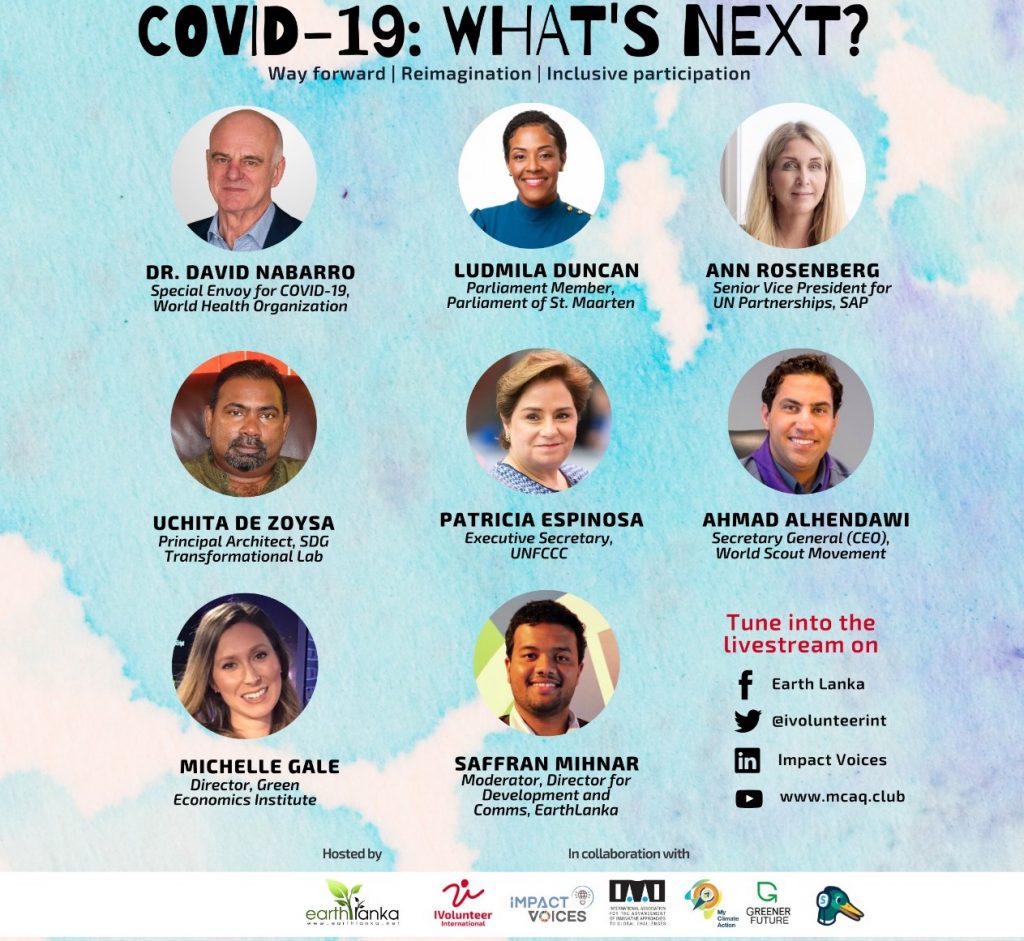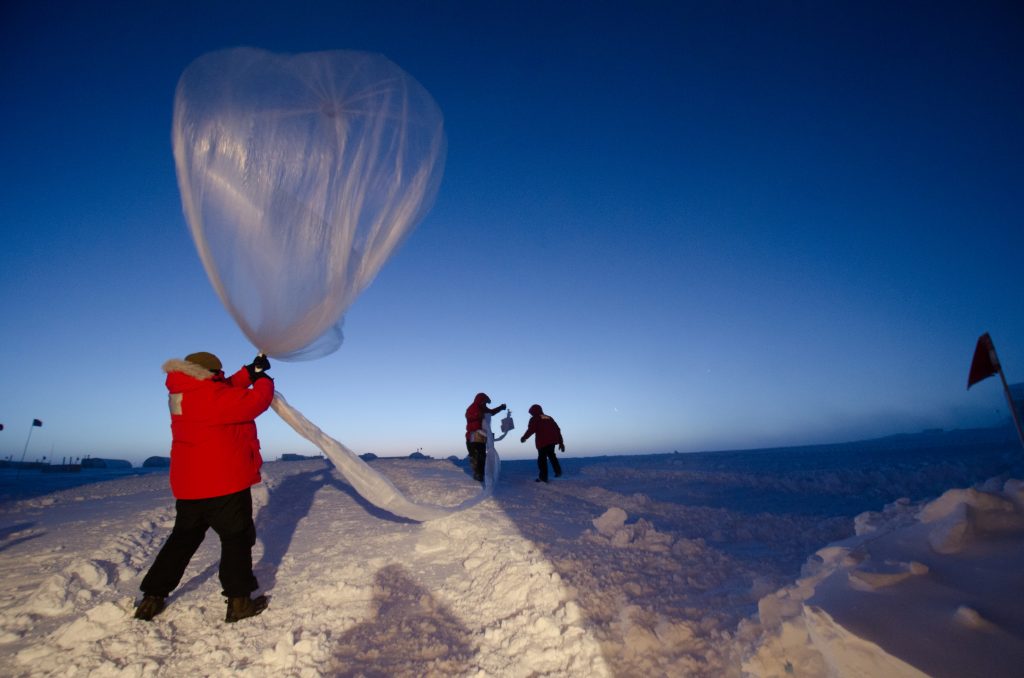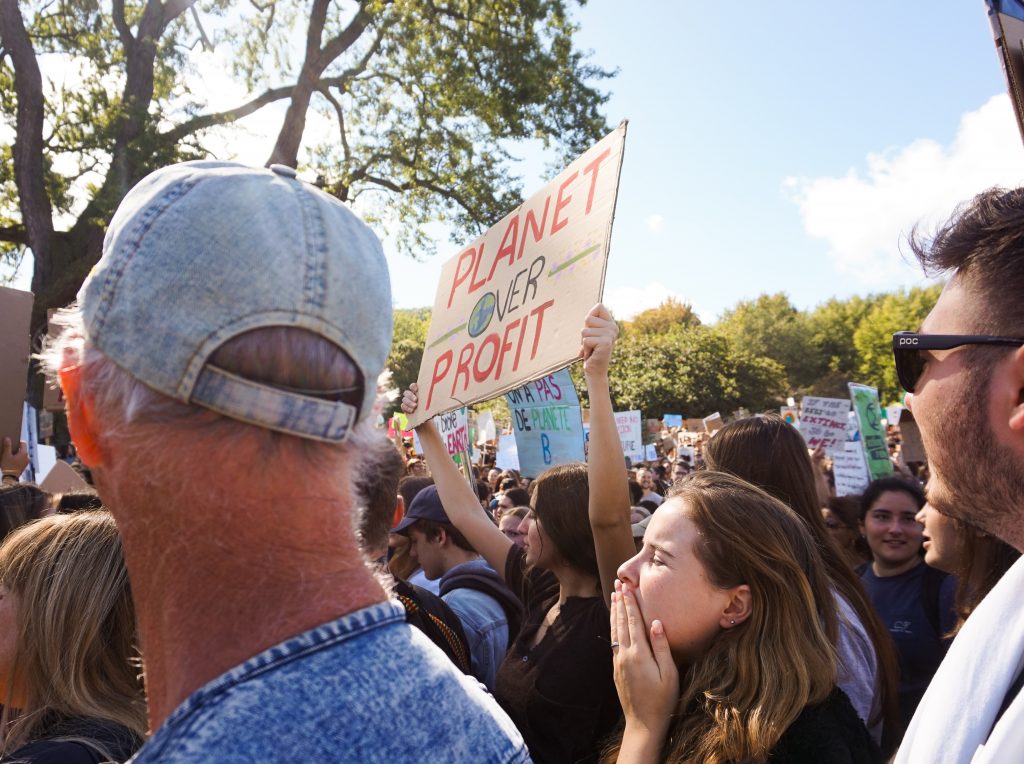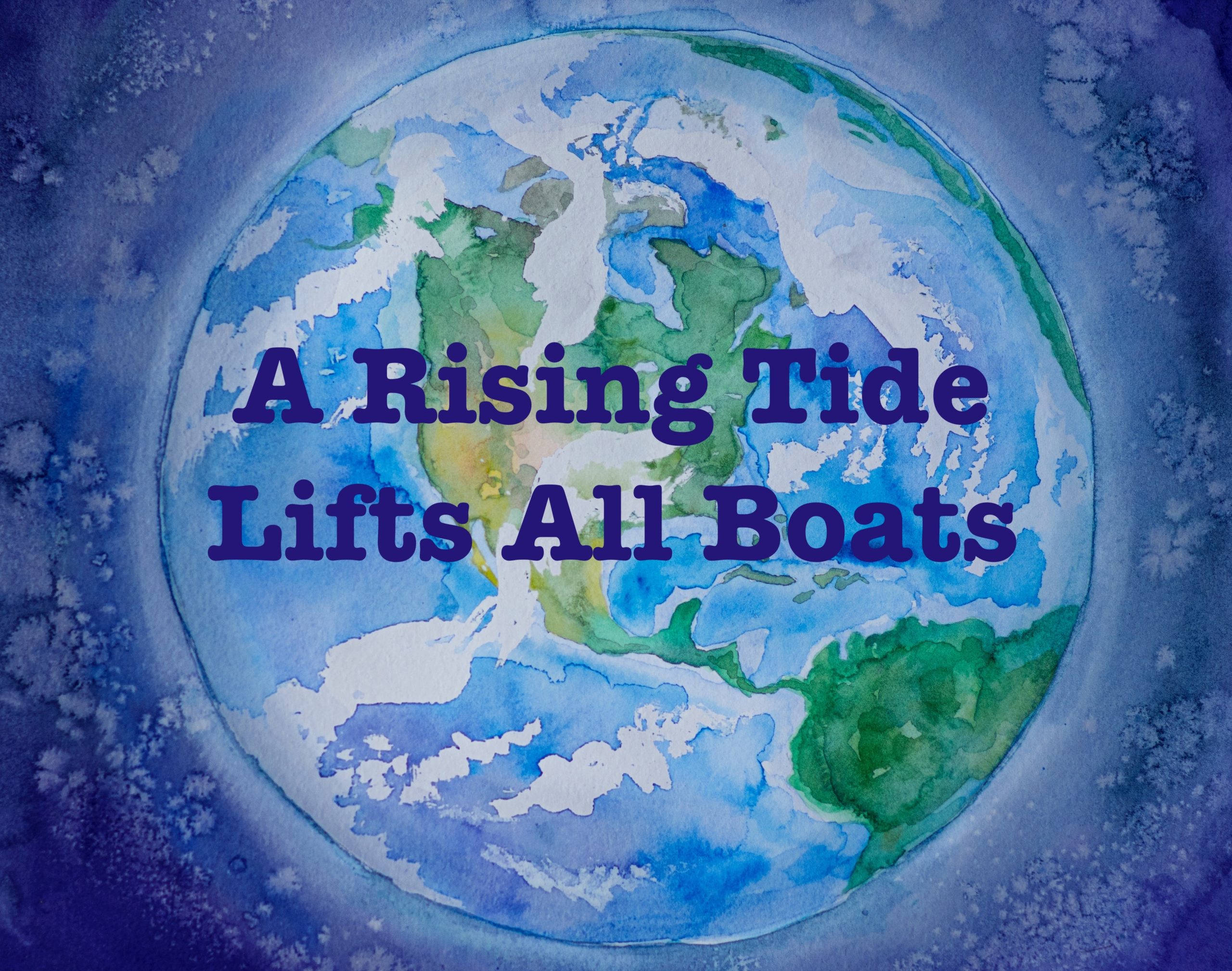“Humanity can get ahead of this virus and in the process create a fairer, more equitable world”
Dr. David Nabarro, World Health Organization
These words would form one of the lead themes of the Earthlanka high-level-meeting: COVID19: What’s Next?. With this 3 hour long conference, featuring an accomplished line up of professionals from both the public and private sectors, I discovered the link between the detrimental impact we have on our planet and the current pandemic. In UNFCCC Executive Secretary Patricia Espinosa’s opening, she discussed the need for our response to the Coronavirus to be linked to climate action. The pandemic may be the most pressing issue of our lifetime, yet climate change will be the most pressing issue to face human existence. With this in mind, our short term goals of overcoming the virus must be interwoven with long-term agendas of forging a more resistant sustainable planet. As it is frequently said, things will not be normal when we come out of this crisis, for that reason, it is with consequential urgency that we must use this opportunity to create a new and better normal. One only needs to look at the current pro-justice protests and civil unrest occurring in the United States and see how they are reverberating around the world to realize that people are tired of prejudice, calling out for a system of governance that works in favor of humanity.

The Economics of “Green”
As our first panelist, the Green Economics Institute’s Michelle Gale took Patricia’s ideas of a ‘new normal’ forward, powerfully expressing the notion of a new dharma in global governance. In her words, ‘short term goals have led us nowhere; profit centric policy merely suits the needs of the corporation machine and not the majority’, before raising the question of what will happen to the global south as climate change worsens. Her argument is not new, nevertheless, it is more important now than ever before, only further highlighted by the pandemic. Economic crises must be targeted alongside the climate crises by way of holistic impact investing. After all, a rising tide lifts all boats. However, on this present course we are set for catastrophe. We need to drive change with positive discourse to shift economics sustainably towards production for the masses, not the mass production.
Transformative Dialogue
Michelle’s points correspond well with the ideas of our next speaker, Uchita De Zoysa working from the SDG Transformation Lab. ‘The current political system is propped up and protected by greed’, he observes, ‘with no space for inclusive dialogue that can then lead to an inclusive system where finances can filter down to the poorer nations’. Within our current system, there is built-in injustice designed to reinforce the status-quo, only working to enhance inequality. A variety of the meetings panelists make reference to this so-called poverty trap. Uchita emphasizes the need for inclusive transformation, an urgent restructuring of global governance which creates space for an equitable society. Built into this is the notion that we can build a resilience-based system, guided by planetary goals which will, instead of delaying the UN’s 2030 Agenda for Sustainable Development Goals (SDG’s), accelerate our actions towards meeting them. Uchita leaves us with a profound message: ‘The Coronavirus pandemic is just another signal that our environment is giving us to transform our path’.

Responsible Business
Proceeding, Ann Rosenberg, Senior Vice President UN Partnership at SAP, argues that while each nation is at a different stage of their Coronavirus response, there is an inherent need for global unity in our efforts. This needs to transcend the world’s high-level leadership and political level to the private sector. As she explains: ‘the most successful businesses during this crisis are those that are sustainable, there is a growing need for entrepreneurs to be socially accountable’. This omni-entrepreneurial ideology she holds, has its roots in the notion that businesses have a responsibility to give back as they take. The private sector will be one of the chief foundations of reaching our 2030 objectives and within that time frame, all enterprises need to become sustainable businesses. For without such a feat, we will fall far short.
Youth Engagement & Mobilization
Highlighting the fact that young people make up around half the world’s population today, Saffran raises the question of how we see the role of under 25’s in the pandemic/post-pandemic world. Asked to panelist Ahmad Alhendawi, Secretary General (CEO), World Organization of Scout Movement, Saffran’s inquiry is an important one. With reference to our last global disaster—the 2007-8 financial crisis—Ahmad responds ‘we won the war but did not secure the peace’. In essence, his point is that we did not sufficiently learn our lesson from the previous catastrophe. While the situation could have been much worse and we prevented a significant ‘lost generation’ as Ahmad explains, sufficient measures were not put in place to safeguard against further human catastrophe. Despite being an entirely different beast, the COVID-19 crisis could lead to a lost-generation or ‘lockdown generation’ as Ahmed regards. Securing the peace would be initiating this new normal and, in his view, the way to do it is to mobilise our youth generation. Emphasised in this point is the importance of youth organisations to overcoming not only our pandemic issues, but also to obtaining a more inclusive and sustainable way forward.

Changing the System
Building from Ahmed’s arguments, Dr David Nabarro, Special Envoy for COVID19, World Health Organization, asserts the need for ‘emerging generations to learn from this pandemic to force governments to interact better’. A recurring theme of the crisis has been in the handling of the recovery. The developing world has far outperformed the developed, while Asia and the Middle East has surpassed Europe and North America, as David proclaims: ‘The north must learn from south; the west must learn from east’. The entire ordeal has been a shock for the global system, a shock, one hopes, so great and inflictable that it will force action on not only public health but also trigger measures to curb climate change and economic disparity.
A SIDS Point of View
Our final panelist, Ludmila Duncan, Member of Parliament, St Maarten, offered insights as to how the pandemic has compounded the natural hazards St Maarten is already facing. The small island developing state (SIDS) heavily relies on imports to maintain itself, this along with a high dependency on tourism and the fact that it is prone to natural disasters make the current crisis a perfect storm. She explains that: ‘despite taking a clear toll on the island, Coronavirus transmission levels are now as low as they can be’. To move forward, in her view, ‘there needs to be a restructuring of industry. Social maneuverability will be the key to how a SIDS can not only prevail over this virus, but build resilience in the long run’. At the same time, political instability has weakened the state and local industry has suffered because of it. This ties into the idea of a new normal and in the case of St Maarten, it means redesigning institutions to be more efficient and adaptive. As we have seen throughout this meeting, there is a big emphasis on inclusion and dialogue with regards to what the global population wants in the post-pandemic world. This is echoed by Ludmila in her closing statement: ‘each and every stakeholder must be included in the decision making process’.

What’s Next?
I see a revolution unfolding, one born from prolific unrest and indignation at a socially unjust system. Earthlanka’s high level meeting highlights this. As David noted, some governments have risen to the occasion of the pandemic, New Zealand, Vietnam, Singapore and China, the list goes on. Others have not fared so well. The recurrent motifs of the crisis are that those states who have typically been in the pilot seat throughout recent history are now faltering at the cracks. It could be seen before, yet amplified now is how the dominant institutions of the world are fraying. We are lagging behind on our climate goals, diplomacy is at an all time low, inequality and a lack of social justice is rampant and now thrown into the mix is a pandemic that, so far, has only sought to exacerbate these deep and generation defining dilemmas. Such plight calls for better. We stand at a crossroads and on our current path we have a crisis of global leadership. Alternatively, we have the so-called new normal, a chance to create a better global standard of prosperity, one led by socially sustainable objectives, putting people instead of profits at the forefront of its dogma. With the BlackLivesMatter protests now resonating across the world, people are already calling out for social justice. Their demands are justified and change is long overdue. If combined with other struggles for a new normal, we could see a real change towards true equitability.
IVolunteer International is a 501(c)3 tech-nonprofit registered in the United States with operations worldwide. Using a location-based mobile application, we mobilize volunteers to take action in their local communities. Our vision is creating 7-billion volunteers. We are an internationally recognized nonprofit organization and is also a Civil Society Associated with the United Nations Department of Global Communications. Visit our profiles on Guidestar, Greatnonprofits, and FastForward.


